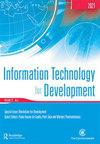成功数字化转型的数字化领导特征概念化:坦桑尼亚案例
IF 5.1
3区 管理学
Q1 DEVELOPMENT STUDIES
引用次数: 7
摘要
摘要:本研究的目的是考察一位引人注目的领导者在正式组织中领导数字化转型的特质。该研究将具有26个特征的数字领导者概念化为5个角色。样本受访者来自坦桑尼亚的一些组织,并使用自我报告问卷进行数据收集。初步分析包括检查领导特质之间的相互关系,在26项中下降了3项。对23个项目的探索性因素分析产生了7个因素,这些因素被分为5个角色,而将2个因素各减一个项目。只有4个因素和13个项目符合验证性因素分析,这与样本数据更为吻合。有效性检验表明,数字领导结构在某种程度上是趋同的,并且这四个因素彼此不同。这意味着,良好的数字领导者有望促进经济增长,促进创新和创业,并改善服务交付。本文章由计算机程序翻译,如有差异,请以英文原文为准。
Conceptualizing digital leadership characteristics for successful digital transformation: the case of Tanzania
ABSTRACT The objective of this study was to examine the attributes of a compelling leader to lead Digital Transformation in a formal organization. The study conceptualized a digital leader with 26 characteristics grouped into 5 roles. Sample respondents were drawn from some organizations in Tanzania and a self-reported questionnaire was used for data collection. Preliminary analysis involved examining inter-correlation among leadership attributes, dropping 3 out of 26. Exploratory factor analysis of 23 items produced 7 factors which were grouped into 5 roles while dropping 2 factors with one item each. Only 4 factors and 13 items qualified for confirmatory factor analysis which provided better fit for the sample data. The validity check showed that the digital leadership construct somehow converges and the four factors were different from one another. It is implied that good digital leader is anticipated to foster economic growth, promote innovation and entrepreneurship, and improve service deliveries.
求助全文
通过发布文献求助,成功后即可免费获取论文全文。
去求助
来源期刊

Information Technology for Development
Multiple-
CiteScore
11.30
自引率
16.70%
发文量
34
期刊介绍:
Information Technology for Development , with an established record for publishing quality research and influencing practice, is the first journal to have explicitly addressed global information technology issues and opportunities. It publishes social and technical research on the effects of Information Technology (IT) on economic, social and human development. The objective of the Journal is to provide a forum for policy-makers, practitioners, and academics to discuss strategies and best practices, tools and techniques for ascertaining the effects of IT infrastructures in government, civil societies and the private sector, and theories and frameworks that explain the effects of IT on development. The concept of development relates to social, economic and human outcomes from the implementation of Information and Communication Technology (ICT) tools, technologies, and infrastructures. In addition to being a valuable publication in the field of information systems, Information Technology for Development is also cited in fields such as public administration, economics, and international development and business, and has a particularly large readership in international agencies connected to the Commonwealth Secretariat, United Nations, and World Bank.
 求助内容:
求助内容: 应助结果提醒方式:
应助结果提醒方式:


